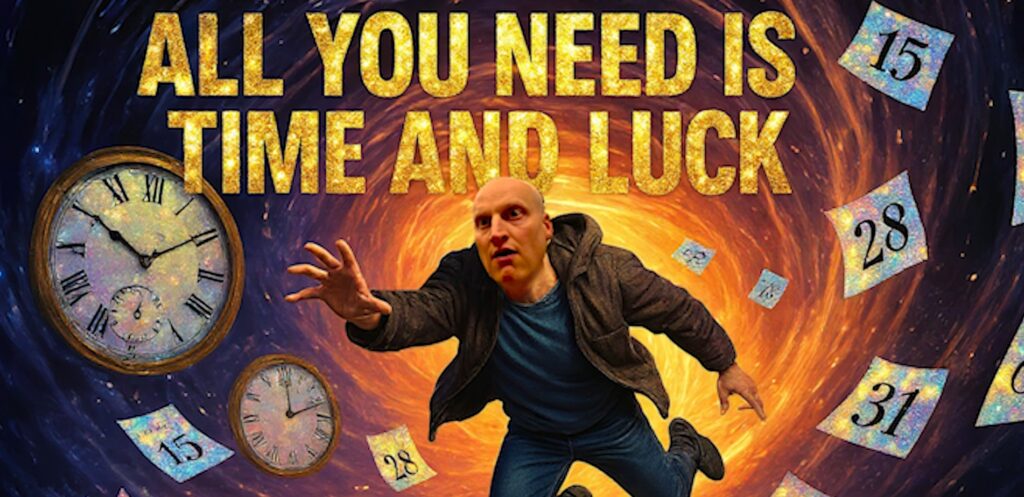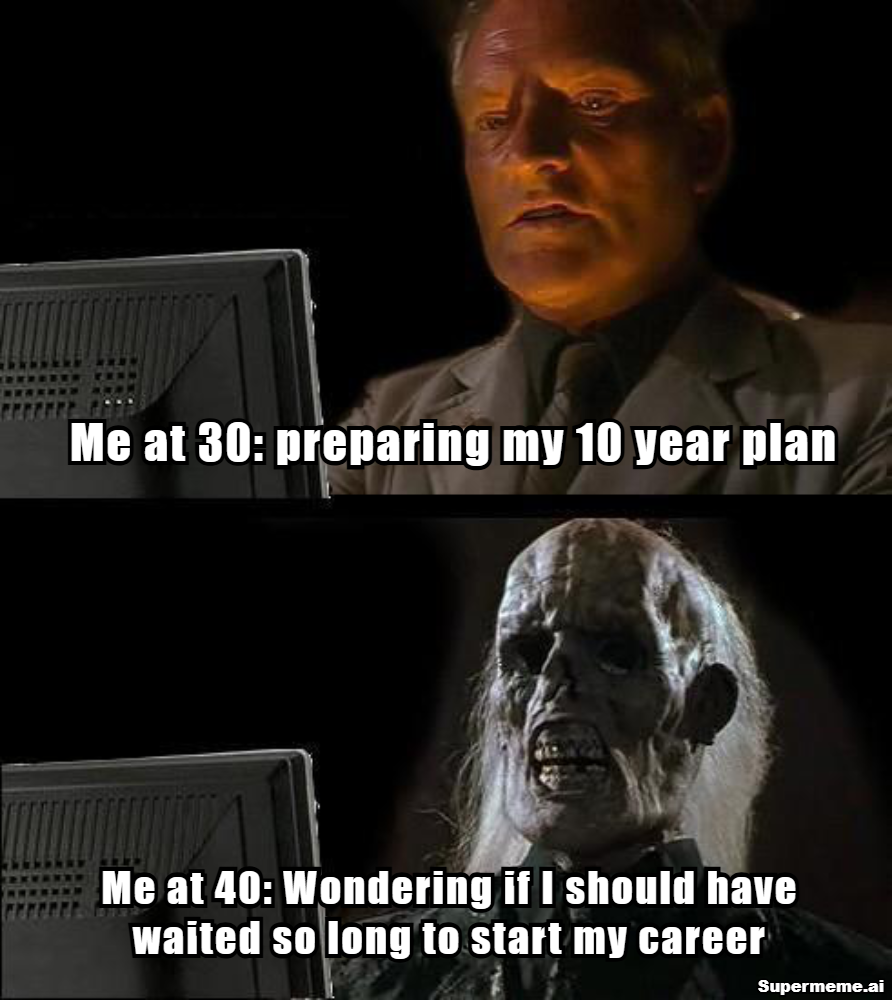Ten Year Plan to Becoming a Full-Time Writer and Independent Filmmaker
About twelve years ago in 2013, I started writing my first book. About a year or two into that, and I found myself addicted. I had a promising career path ahead of me in the home construction world, but I’d just found a passion that was quickly eating at my ambition to be a general contractor for the rest of my life.

Don’t get me wrong, I was incredibly grateful for my work as a contractor. I learned so much, had a great time doing it, and it held the promise of bringing in a good stable income. But that annoying artistic bug had sunk it’s tick-like head into my skin, and I couldn’t help but want to make a run at creating stories.
So, unbeknownst to everyone else in my company, mostly family and close co-workers, I decided to put a plan together of how I would one day fulfill my budding dream of becoming a full-time writer, and since film was starting to grow on me, an independent filmmaker as well.
- How I Wanted To Prepare For a Career in Art
Back in 2015, I wasn’t aware of the movie world being in such distress as it is today. Yes, I knew that it often had its creative slumps that could easily last a decade, but at the time, Blockbuster had just closed its doors, and Netflix was on a spending spree.
However, I was very aware that books were struggling, and that struggle would only get worse. Self-publishing was becoming a big thing, and I’d experienced first hand, how easy it was to publish your own book without a need for all the gate-keepers. Plus, I’d seen how the digital revolution had thrown the music world for a loop over the proceeding years.
All in all, I had a funny feeling that if I wanted to become a self-published writer and independent filmmaker, I might have to plan on some very lean years for the first few years that I started. What I did not want to do, was to make the leap, then find myself crawling back to my construction job as a failure because I ran out of money and could no longer support my family.
For that reason, I decided to take the next 10 years, and prepare myself for the change. I figured this would give me enough time to prepare for what would be a major U-turn in my life. Now I know that some people would be less inclined to take the long approach like this. I consider myself a risk-taking sort, but there’s still a mean conservative streak that courses through my bones.
One of the problems with taking a long-term approach to something like this, is that at the end of 10 years, without proper resolve, you might find yourself exactly were you were when you decided that you wanted to make the change. That’s why setting clear goals and making processes for achieving them became a huge priority in my life. Eventually I even had to tell others of my plan to hold myself accountable.
In the beginning, I had a full time job, paying $45,000 per year. I had a wife and my first kid, with another one planned in the following year. I had also graduated college with a degree in Finance, and got my MBA. Luckily at this time, I had managed to pay off all my debts. That is a story for another day, but I’ll be happy to share that sometime with you also. Just know, it meant a lot of hard work, and eating nothing but eggs and rice for a couple of years.

Anyhow, to the goals, as it’s impossible to measure your progress without them:
- Goals:
- Keep writing more books, and learn how to write better stories
- This was important, because it was what I enjoyed doing, and I wanted to be the best I could be. After 10 years, I wanted to be able to have books that people would want to buy.
- Learn Filmmaking
- Once I caught the bug for turning my stories into movies, I had to take this step. When I was a kid, I always wanted to do something with movies, but never thought it was within my reach. But since I’d just finished my masters degree, was working full time, and raising my family, I didn’t have time to go to film school. Life was in full session. So I decided to create my own curriculum, which included:
- Reading everything I could on how to make movies
- Consuming everything YouTube had to offer on making movies
- Breakdown/study the movies I liked the most
- Study behind the scenes videos
- Make some short films
- Take acting classes
- Start collecting the gear I would need
- Once I caught the bug for turning my stories into movies, I had to take this step. When I was a kid, I always wanted to do something with movies, but never thought it was within my reach. But since I’d just finished my masters degree, was working full time, and raising my family, I didn’t have time to go to film school. Life was in full session. So I decided to create my own curriculum, which included:
- Learn the business side of Filmmaking
- I already owned one small construction company, and was working for my families larger construction company, but I knew there were still things I didn’t know that I didn’t know yet, when it came to running a successful company.
- Save and invest enough money to support my family and my career, assuming that the new career would make little to no money for the first few years.
- This is one of the hardest parts of this plan. I had the financial understanding of how money works along with the self control to stick to a financial plan, but life can come at you fast, and so I had to be prepared as best I could, and I had to better my circumstances, as I was only making $45k a year. One thing that also helped, was that my wife is a very frugal person. She never needed the latest and greatest of everything, and she loves shopping for our needs at the second-hand store. Even though she was/is nervous about my goal to become an artist, she has supported my vision from day one. I don’t think I could do this without her.
- How to Prepare Financially
Learning how to write better, and to make movies was never going to be the hardest part for me. I still needed goals there, I knew how to push myself, and I was having too much fun learning about it all to slacken my resolve there. What I needed to focus on most, was my finances.

Now, I did get my degree in finance, as I mentioned. I also had my MBA, but that didn’t mean that I could easily apply all those skills yet. Luckily, in my family’s larger construction company, I was currently on a career path that would lead me into the upper management of the company over the coming years.
This is originally why I joined the company, because when I got my finance degree, I was actually pursuing a goal to work on Wall Street. However, when my dad asked me to join the family business, I decided that learning some valuable business skill by doing them, would be immeasurably valuable. I was right. But he started me at the bottom, and had me work my way up. I became very handy, learned about quality control, customer relations, employee relations, bidding, bookkeeping, marketing, accounting, and financing. Those were good skills that over the course of my ten year plan, I would have needed to learn anyways.
What I couldn’t learn at work, was some of the investing/financing that I felt I’d need to really secure my future. I didn’t want to pay a financial planner for something that I had gone to school to learn, and so I started slowly dabbling and learning how to invest each year.
Stocks were always going to be a part of my plan, so I reserved a little money to work on that. My biggest investment though, was in my family’s company. Every nickel I could spare, I re-invested back into that company, effectively becoming a real-estate investor.
At first, it seemed like my investments were so small and pointless. But each year, they got bigger. As I earned more money from the company, and was able to pour it back into the business, I think around year five, my investment hit the 7 figure mark.
They always say, that 1st million is the hardest. Boy, I felt that. I remember back in my early twenties, my goal was to have $1,000,000 by the time I hit 30 years old. I worked hard at that too, but it took me till I was about 35 years old. Looking back, I have to say, not bad. It came from making a lot of good choices, working hard, saving, investing, and frankly, a little bit of luck. Though I tried my best to live by the philosophy that we have a huge influence on our own luck.
If I didn’t have access to the family business also, I think I would have still found a way to reach that milestone in my life. Though it might have been on Wall Street, or it might have been in creating a startup. I was very ambitious then, and I was very goal oriented, as you may have noticed by now.
Granted, I know others have made lots more than me by that point in their lives, but there’s always going to be a bigger fish out there who made it happen bigger and faster than me or you. Good for them! Maybe good for you…
If that first million seems completely out of reach for you, then I would suggest finding a mentor, someone who is making good money. Learn from them. The only reason someone can’t thrive, especially in America, is because they are trapped in a culture that prevents it. I’ll have to do a posting on just culture one of these days, because I firmly believe that anyone can find success, but not everyone will believe that this success mindset applies to them personally.
Before I digress, lets finish this out. At five years into my plan, and one million worth of investments, I still had a long way to go. But you have a million bucks? Why not start now?
Because a million bucks isn’t what it used to be, and making movies is expensive. Raising a family is expensive, too. Some people might be willing to dive off that cliff, but I needed a better safety net. I needed to get to the point, where my investments paid me to run a losing venture. How do I mean?
Its like this: If you have 1,000,000, the most you’ll likely get as a return on it if investing is close to $100,000 per year, assuming you’re getting a 10% return on your investment. After taxes, you’re probably closer to $70,000. In truth, that’s not nearly enough to get by on with this plan, so you’d really end up spending the money you’d want to use as an investment. If I only had $1m to start with, I knew I’d run out of money in 2-3 years, because you will not only have your family expenses of living, which when you consider inflation, keep going up. Then you have the costs of running a business, which include your payroll, payroll taxes, marketing, office overhead, tools of the trade, and the expenses of actually producing movies, which hit hard and fast.
I did the math, and realized I wanted a lot more. Everyone is different, and your goals might be different from mine. You might be more comfortable asking others for money to invest in your film projects, and you can eventually bootstrap your business that way. In that case, that first million might be just fine as an investment seed, but you’ll be strapped.
For myself, my goal was to have enough investments, that I could start a studio business that didn’t have to make money to break even. For me, that meant actually owning a studio, and to pay for it by having other commercial buildings that I could rent out, then using that rental income to pay for my studio building.
That meant that around year 8, I needed to buy some property, and start developing it for these rentals and my studio. The money was very tight, but I was able to pick up 4 acres of commercial property at that time. I couldn’t afford to develop it yet, but getting the permitting and plans through the city would take another year at least, time enough to keep working on my finances to that when I did get my approvals, I could afford to built it.
If you recall, I also mentioned that stocks would be a large part of my investing strategy. At year eight, I was still struggling to get any kind of return on my stock investments, however, I knew that it could be done. Since I planned on my commercial properties paying for my studio building, I was depending on my stock investing to pay for my living wages.
So for the next two years, I spent hours each day, studying the stocks, bonds, and futures markets. I bought courses from trading gurus, I tried trading real and fake money, using every bit of advise I was learning, trying desperately to figure out what would work for me.
It took until the end of year 10 in my ten year plan when everything seemed to finally click on my stock trading. Year 10 was my very first profitable year in the stock markets, using a strategy that fit my schedule and style. It was a lot of hard work, but I finally got that piece of the puzzle figured out.
That brings me to now, the end of my 10 year plan. You’re all caught up on how I got to the point where I’ve started stepping back from my family construction business, and leaning full time into my writing and filmmaking career.
I still give the construction company a couple days each week, since I still have investments tied up in there, and I want to make sure that they can make a smooth transition from needing me there all the time. Also, I’ve been held up on permitting for my commercial property, so I don’t have a new office to move into just yet. Plus between surgeries and moving into a new house this year, year 11 has been more of a limbo/transitional period.
But its given me a soft exit and entrance into this new venture.
There you have it folks. This is how I’ve decided to follow my dream. I get that its not for everyone, and it takes a lot of dedication, and hard work. For some of you, you might be in a position where you can jump right in at the ground floor of some production studio, eventually working your way up, or finding a niche that you like within the ranks. For me, I wanted full ownership, full control, and freedom to pursue the kind of projects that interest me. This meant sacrificing ten years and using that time to the very best of my ability, pushing myself to meet every goal I made early on and as my plan evolved.
Well, I’ve laid myself pretty bare for you here, but this is all just a 1000 ft view of my journey thus far. If you’re like I was ten years ago, wondering how you can go from being a broke college grad, or maybe you haven’t even gone to college yet, but are wondering how you could possibly turn an artistic life into your mainstay, then stick around. Subscribe to my blog and my YouTube Channel. I am so grateful for the life I’ve lived thus far, and the things I’ve learned along the way. And while I may not have any great tutorials or workshops to share, I do plan to share as much of my journey as possible, so that if you can find any way of gleaning something from my experience and lessons learned, then maybe you too can find the success you need as a creative.

Leave a Reply